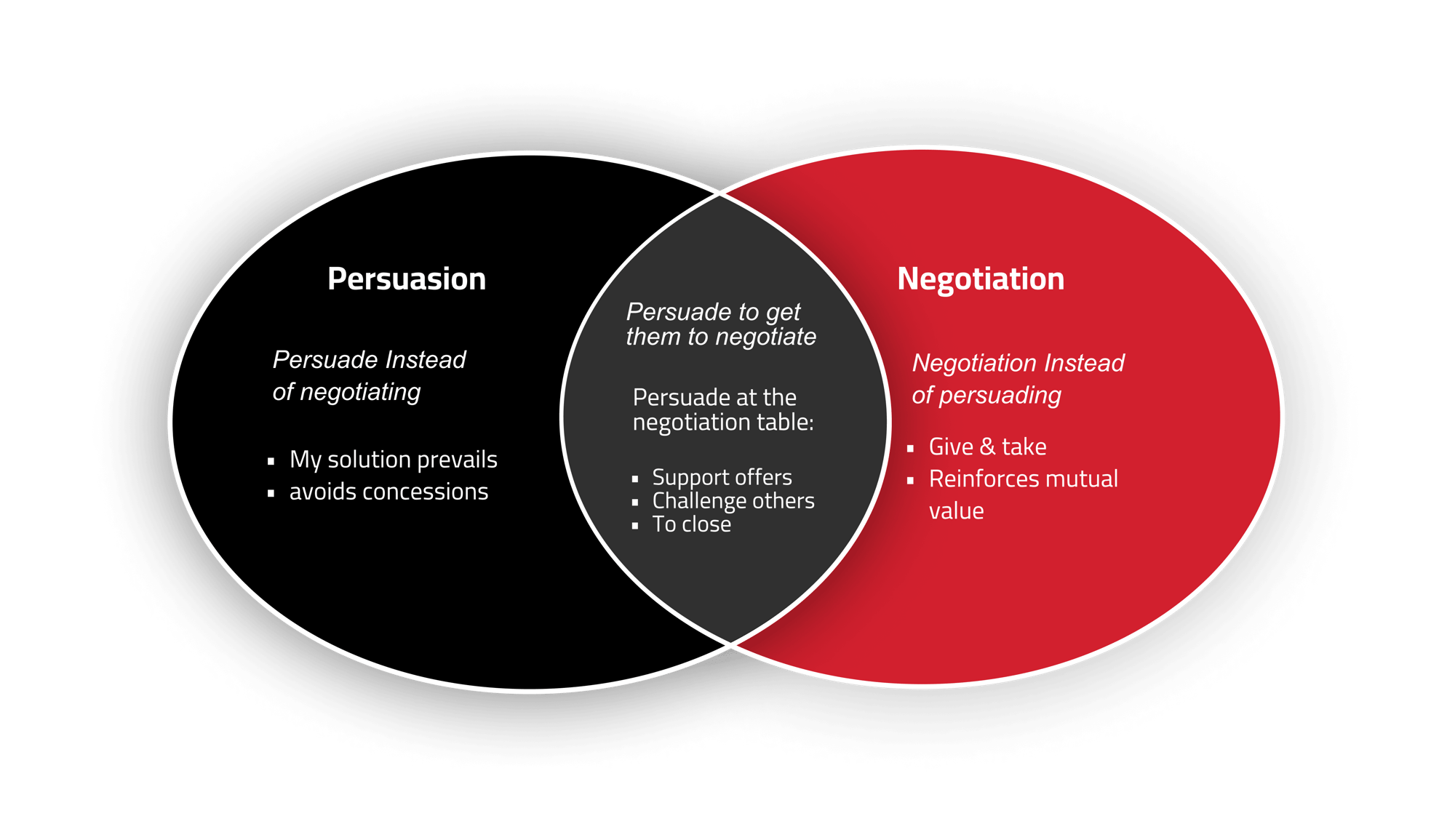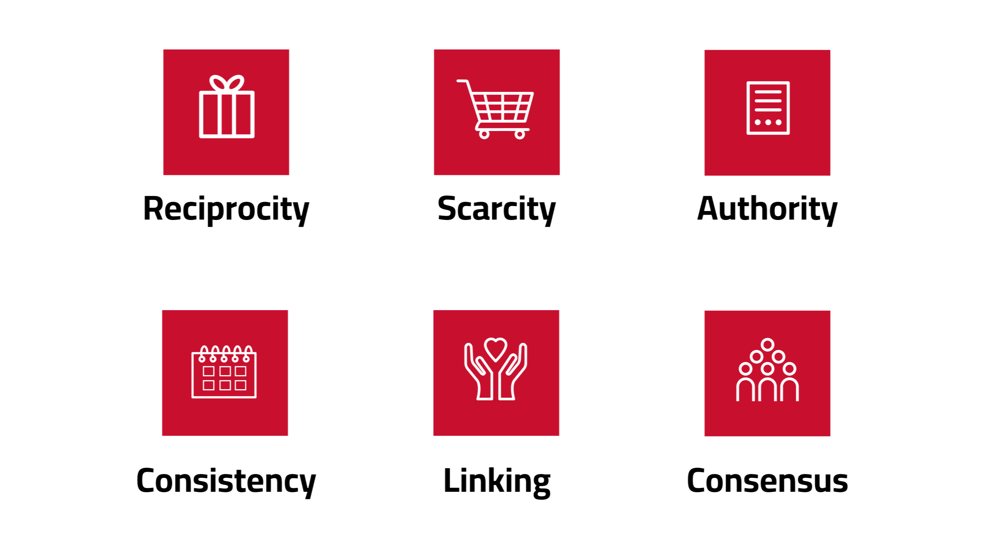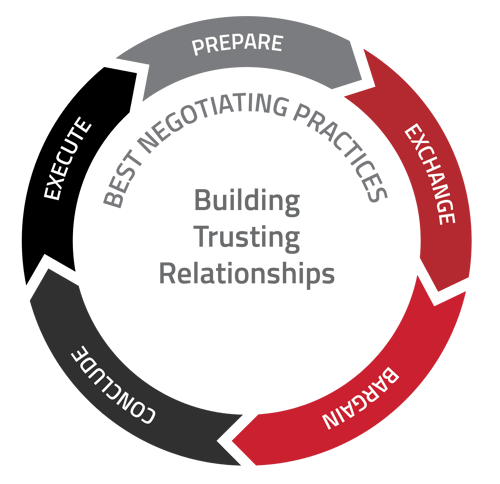When we talk about negotiation, there’s a certain amount of confusion whether we mean negotiation or persuasion.
In my first blog in this series, Why Understanding Is Crucial to Successful Negotiations, I defined negotiation as being a process which required both parties to be able to vary the terms.
What are the differences between negotiation skills and persuasion skills?

Negotiation skills
The crux of effective negotiation skills sees both parties moving closer together to achieve a compromise.
Persuasion skills
Persuasion or influencing on the other hand is the process of getting the other side to do what you want them to do.
Negotiation skills: When are they used?
While you may not necessarily see yourself as a connoisseur in negotiation skills, it’s likely you’ve been in scenarios whereby you’ve negotiated to reach a suitable outcome.
For example, whether you’re applying for a new job, or attending an annual review with your employer, there’s always a discussion about salary. In such cases, it’s rare that you take the first offer that’s put on the table. An opening offer is made, you feedback, and eventually, a compromise is made, i.e. you use your negotiation skills to get the most lucrative offer.
The same principles apply when people sell their houses. Although the interested party is most likely itching to exchange contracts and get the deal done, they’ll try every trick in the negotiation skills handbook to reduce the price and secure a reduced price.
6 principles of persuasion

Persuasion skills: When are they used?
As is the case with negotiation skills, persuasion skills are used regularly, and it’s likely you’re much more persuasive than you think.
Let’s revisit the previous example of salary negotiations. In this case, the employee will naturally try and negotiate for more money. However, they’ll have to use the art of persuasion to convince their manager.
Similarly, in the case of the house negotiations, the prospective buyer will try and negotiate a lower price, but will need to persuade the owner why they ought to accept lower than the initial asking price.
The art of persuasion is often called negotiation. During the Association of Professional Sales’s latest seminar, the hostage negotiator Richard Mullender said the process he used to be involved in wasn’t a process of negotiation, because there was no compromise. He was never in a situation where he could comply with the hostage taker’s demands; his sole focus was to “get them off the roof or get them free”.
Negotiation skills: How to effectively persuade the other party
To become proficient in negotiation skills, you need to recognise when and how you need to use persuasion skills. This is likely to happen at points in the negotiation where you don’t seem able to agree. It’s also important to understand how to persuade effectively in these situations.
In a global negotiation research project, we asked respondents which persuasion strategy they would use in such a situation.
The highest number voted for asking the other side to present their point of view; followed by asking questions.
The positive here is the relatively low number who would just present their own point of view. This is because we know from our research into persuasion that presenting our own opinion won’t necessarily change somebody else’s. Logic isn't persuasive!
In his presentation, Mullender substantiates this from his own experience by saying that he isn’t looking to change the other person’s opinion. He’s merely looking to understand their opinion so that he can use it against them to get the outcome he’s looking for.
Overall, asking the other side to present is the preferred option. However, it's not the most popular for those respondents to our survey who claimed to be very successful; by this we mean that over 75% of their negotiations were successfully implemented without the need to renegotiate.
In comparison, the Unsuccessful group, those who had to renegotiate more than 50% of their negotiations, were far more likely to ask the other side to present.
Grab your copy of ‘Developing Effective Negotiation Skills’
Learn tactics negotiators to avoid direct disagreement, plus tips for clear communication how to gain trust.
Use of questioning to build persuasion in negotiation
Questions are powerful because they get the other side talking. But the real art of questioning lies in listening to what is said. This doesn't mean hanging onto every word.
Mullender’s definition of listening is “the identification, selection and interpretation of key words that turn information into intelligence”. His definition of intelligence is “information that you use to your and their advantage”.
In selling situations, the key words that a user of our SPIN® Selling Skills model would be listening out for are Implied and Explicit Needs. An effective salesperson is somebody who can turn that information into intelligence in the form of Benefit statements.
What is a benefit statement?
Making benefit statements requires sellers to dig into the problems or Implied Needs, which is exactly the same as Mullender’s advice to “steer into the distress” in hostage situations. Only by uncovering the true source of the distress can you then identify the Explicit Needs (what the other side wants to do about it) and hence make benefit statements.
Unsurprisingly Mullender makes reference to SPIN® as a “stunningly clever” model for use in these situations.
In conclusion, we can say that although negotiation can be viewed as a different part of the process and a different skill set to selling/persuasion an effective negotiator still needs to be able to deploy appropriate persuasion strategies in a negotiation situation.
This is why we advocate that negotiators should learn effective sales skills as well as negotiating skills to help them achieve win-win outcomes.

Free download
Download your copy of 'Developing Effective Negotiation Skills' and discover how negotiators avoid direct disagreement, plus expert advice on how to clearly communication and gain trust.
Tell us your perspective

Sign-up and never miss an episode, perfect for busy people who don't have time to listen
Featured Video
Sign up to our newsletter
Sales, negotiation and communication insights direct to your inbox.
All the latest blogs, research and podcasts from Huthwaite International.






